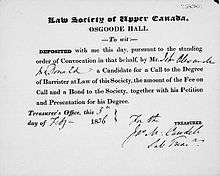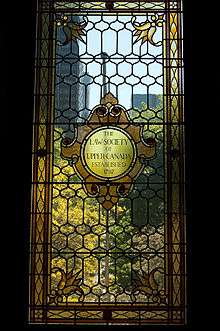The Law Society of Upper Canada
.png) | |
| Abbreviation | LSUC |
|---|---|
| Motto | "Let right prevail" |
| Formation | 1797 |
| Type | Law society |
| Purpose | Advocate and public voice, educator and network |
| Headquarters | Osgoode Hall, Toronto, Ontario |
Region served | Ontario |
Official language |
English French |
Treasurer | Paul Schabas |
CEO | Robert Lapper |
| Affiliations | Federation of Law Societies of Canada |
| Website |
www |
The Law Society of Upper Canada (LSUC) (French: Le Barreau du Haut-Canada) is the law society responsible for the self-regulation of lawyers and paralegals in the Canadian province of Ontario.
History

The Law Society was created in 1797 to regulate the legal profession in the British colony of Upper Canada.[1] The Law Society has continued to retain its original name, even though Upper Canada ceased to exist as a political entity in 1841. The Society governed the legal profession in the coterminous Canada West from 1841 to 1867, and in Ontario since confederation in 1867.
The Law Society of Upper Canada's creation by an act of the Legislative Assembly of Upper Canada came some 20 years before the earliest such self-governing association in any other Canadian province or territory. Its creation was an innovation in the English-speaking world and it became the model for law societies across Canada and the United States. It is one of the oldest Law Societies in the English-speaking world.
In 1994, the Law Society affirmed its role by adopting this Role Statement: "The Law Society of Upper Canada exists to govern the legal profession in the public interest by ensuring that the people of Ontario are served by lawyers who meet high standards of learning, competence and professional conduct, and upholding the independence, integrity and honour of the legal profession, for the purpose of advancing the cause of justice and the rule of law."
Oversight

The Law Society regulates more than 44,000 lawyers in Ontario. It is responsible for ensuring that lawyers are both ethical and competent. The Society has the power to set standards for admission into the profession. It is empowered to discipline lawyers who violate those standards. Available sanctions range from admonitions to disbarment. It is based in Toronto, at Osgoode Hall.
Paralegals
Effective May 1, 2007, as a result of amendments to Ontario's Law Society Act, the Law Society regulates more than 4,200 paralegal licensees in Ontario. Paralegals are licensed to provide limited legal services, such as providing representation before provincial tribunals.
Tribunal decisions
Effective March 8, 2008, the benchers of Convocation, who also serve as adjudicators at discipline hearings and corporate directors at Convocation, voted to begin publishing tribunal decisions wherein impugned members successfully defended themselves at hearings for future cases. The following year, the society voted to add past decisions as well, but confusion has remained.
Treasurer
The society is headed by a Treasurer. He or she is selected by the benchers, who comprise "Convocation" - in effect, the Society's board of directors as the Society is an Ontario Corporation without share capital. All lawyer-benchers are elected by the Society's members, and eight lay Benchers are appointed by the provincial government. Section 12(2) of the Law Society Act, R.S.O. 1990, provides that Ontario's Attorney General is a Bencher of convocation while section 13(1) provides that the Attorney General is "Guardian of the Public Interest" and, as such, may require the production of any document or thing possessed by the regulator. The regulator falls under the supervision of the Ministry of the Attorney General, according to the ministry's web site.
The current Treasurer is Paul Schabas. The current CEO of the Society is Robert Lapper. In 2013, the Law Society had more than 500 staff.
The Law Society is frequently named one of Greater Toronto's Top Employers by Mediacorp Canada Inc., most recently in 2013.[2]
See also
References
- ↑ Moore, Christopher (2015-02-01). The Law Society of Upper Canada and Ontario's Lawyers, 1797-1997. University of Toronto Press. ISBN 9781442655942.
- ↑ "Reasons for Selection, 2013 Greater Toronto's Top Employers Competition".